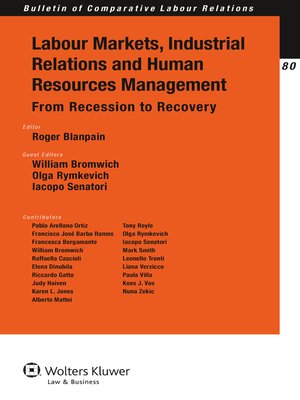Labour Markets, Industrial Relations and Human Resources Management
ebook ∣ From Recession to Recovery · BULLETIN OF COMPARATIVE LABOR RELATIONS
By Roger Blanpain

Sign up to save your library
With an OverDrive account, you can save your favorite libraries for at-a-glance information about availability. Find out more about OverDrive accounts.
Find this title in Libby, the library reading app by OverDrive.



Search for a digital library with this title
Title found at these libraries:
| Loading... |
Social models are always contested and ambiguous. This is particularly evident in the field of human resources management, where decisions that ultimately affect the patterns of social relations are made every day. This collection of in-depth essays focuses on some central human resources elements – gender, youth, ageing, educational background, training, workers' rights – providing an up-to-date summary and analysis of how employers are dealing – and should be dealing – with workforce characteristics under current globalized forces. The emphasis is on Europe, but valuable insights come also from Chile, Canada, and the United States. Sixteen experts discuss such important issues as the following: the shift from intervention in favour of workers' rights towards corporate neo-liberal policies; importance of transnational framework agreements in countries where a trade union; tradition is lacking; evidence that provision of childcare promotes female labour market participation; short-time working, labour hoarding, and labour underutilization; enhancing training policies for employable skills; enforcement of corporate social responsibility; alarmingly high rates of precarious employment; worldwide decline of full-time permanent positions; pension system reform; over-exposure of young people to non-standard employment; discouraged workers; regional imbalances in employment policy; and weaknesses of education programmes in connection with the world of work. Industrial relations and human resources professionals as well as employment lawyers worldwide will welcome this incisive analysis, and academics everywhere are sure to benefit from its evidence, insights, and proposals. The book presents a selection of papers from the international conference in commemoration of Marco Biagi entitled Europe 2020: Comparative Perspectives and Transnational Action, held at the Marco Biagi Foundation in Modena, Italy. 17–19 March 2011.







